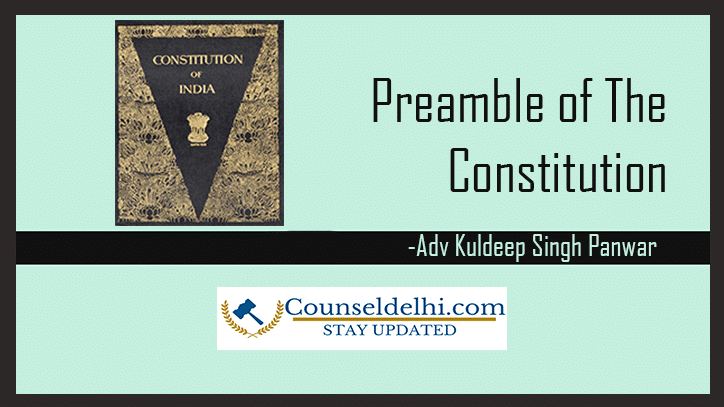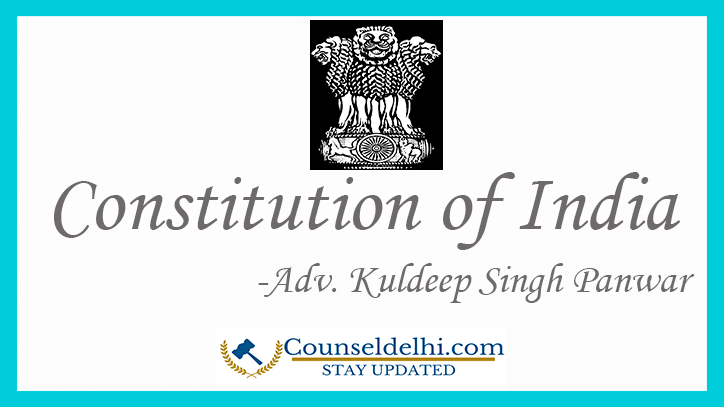Preamble of the Constitution
The manual, introductory, or blueprint of any act or legislation is known as the preamble. It states the basic idea, principles, objective, and philosophy about the act or legislation. Every act of legislation has its manual or a preface.
The preamble of the constitution of India is preface and manual of the constitution that provides us its objective or aim, philosophy and its principles. The word preamble is taken from the Latin word Praeambulus which means walking before. That’s preamble does- explaining statement or explaining what’s coming next.
The Preamble of Indian Constitution
WE, THE PEOPLE OF INDIA, having solemnly resolved to constitute India into a SOVEREIGN SOCIALIST SECULAR DEMOCRATIC REPUBLIC and to secure to all its citizens:
JUSTICE, social, economic and political;
LIBERTY of thought, expression, belief, faith and worship;
EQUALITY of status and of opportunity;
and to promote among them all
FRATERNITY assuring the dignity of the individual and the unity and integrity of the Nation;
In Our Constituent Assembly this twenty-sixth day of November, 1949, do Hereby Adopt, Enact And Give To Ourselves This Constitution.
It was Drafted by Pt. Jawaharlal Nehru and presented on 13th December 1946 after that it was adopted by the constituent assembly on 22 Jan 1947.
The preamble of the Indian Constitution was only one time amended and we can say modified by 42nd Constitutional Amendment, 1976, and there were three words added in it -socialist, secular, integrity. Through this it constitute India into a Sovereign, Socialist, Secular and Democratic Republic. It secures justice, liberty, equality to all citizens of India and promotes fraternity amongst the people. The words of the preamble give the idea of the whole constitution which is as:
We the people– It tells its source or power of the constitution.
Nature of the Indian state– Sovereign, Democratic, Secular, Socialist, Republic
Objectives of the constitution– Justice, Equality, Liberty, Fraternity
Date of the constitution’s adopted by the constituent assembly on 26th November 1949.
Elements of the Preamble:
- It is showed by the Preamble that the source of power of the Indian constitution kept with the people of the Indian Territory.
- It declares the nature of India to be a sovereign, socialist, secular and democratic republic.
- It provides the objectives of the constitution of India are to secure justice, liberty, equality to all citizens, and promote fraternity to maintain unity and integrity of the nation.
- The date in the last line of the preamble stated when it was adopted i.e. November 26, 1949.
Components of Preamble:
- Sovereign
The word ‘Sovereign’, it states Independent State. Which means it can manage its internal subjects. There is no external power can interfere in it. India is an independent State. It is not a dominion of any external state power.
- Socialist
The word ‘Socialist’ was added in the Preamble by 42nd Amendment, 1976 which means the welfare state. This totally generated from the philosophies of Mahatma Gandhi and Pt. Jawaharlal Nehru which established this into a welfare state.
- Secular
The word ‘Secular’ was also added in the Preamble by 42nd Constitutional Amendment, 1976 which means that SARVA DHARMA DAMA BHAVA. It means that there is not a separation of religion and state, but an attempt by the state to embrace all religions. In the Indian context, the state has no religion. In India, this word is used in a positive aspect. It provides people with the freedom to practice, profess, and propagate.
- Democratic
The word ‘Democratic’, this word means people Rule. The government formed by the people govern over the people. The democracy establishes the form of governing body which generate the power or authority from the will of the people towards its desirable representative in elections.
- Republic
The word ‘Republic’ expresses that head of the state is elected by the directly or indirectly by the people of India. There is no heredity system in India.
Important Question: Is preamble a part of the constitution? And is it amendable?
Answer: First of all we have to read Article 368 of the constitution. Power of Parliament to amend the Constitution and Procedure, therefore…
It gives the power to parliament to amend the constitution.
Here are the two important cases to discuss for clarification over this.
- In Re: Berubari Union Case, 1960– In this case, it was decided that the Preamble is not a part of the constitution so it cannot be amended by Parliament.
- Kesavananda Bharti vs State of Kerala, 1973: Later on the Supreme Court decided that Preamble is also like any other part of the constitution so it can be amended which does not affect its basic structure. Preamble is also adopted like other parts of the constitution.
Preamble can be amended by the parliament but which does not affect its basic structure.





